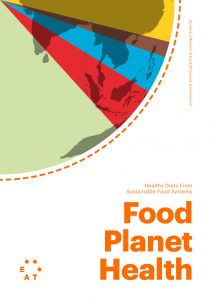-
- Bailey, Rob, Antony Froggatt and Laura Wellesley. “Livestock – Climate Change’s Forgotten Sector: Global Public Opinion on Meat and Dairy Consumption.” London: Chatham House, The Royal Institute of International Affairs, 2014.
- Benton, Tim G., Carling Bieg, Helen Harwatt, Roshan Pudasaini and Laura Wellesley. “Food System Impacts on Biodiversity Loss: Three Levers for Food System Transformation in Support of Nature.” Chatham House. 3 February 2021. Accessed 6 February 2021.
-
- “Plant-based diets crucial to saving global wildlife, says report”. The Guardian, 3 February 2021. “Vicious circle of cheap but damaging food is biggest destroyer of nature, says UN-backed report.” https://www.theguardian.com/environment/2021/feb/03/plant-based-diets-crucial-to-saving-global-wildlife-says-report
- Crippa, M., E. Solazzo, D. Guizzardi, F. N. Tubiello, and A. Leip. “Climate goals require food systems emission inventories.” Nature Food 3:1 (2022). DOI: 10.1038/s43016-021-00450-2.
- Crippa, M., E. Solazzo, D. Guizzardi, F. Monforti-Ferrario, F. N. Tubiello, and A. Leip. “Food systems are responsible for a third of global anthropogenic GHG emissions.” Nature Food 2 (2021), 198-209. https://doi.org/10.1038/s43016-021-00225-9 and the EDGAR-FOOD database.
-
- EDGAR-FOOD is the new global food emission database estimating greenhouse gas (GHG) emissions for the years 1990-2015. It is the first emission database of GHGs covering all countries and sectors of the food system, from production to disposal.
- EAT-Lancet Commission Summary Report (2019). https://eatforum.org/eat-lancet-commission/eat-lancet-commission-summary-report/
- “Transformation to healthy diets by 2050 will require substantial dietary shifts. Global consumption of fruits, vegetables, nuts and legumes will have to double, and consumption of foods such as red meat and sugar will have to be reduced by more than 50%. A diet rich in plant-based foods and with fewer animal source foods confers both improved health and environmental benefits.”
- Garnett, Emma E. et al. “Order of meals at the counter and distance between options affect student cafeteria vegetarian sales.” Nature Food 1 (2020), 485-488. DOI: https://www.nature.com/articles/s43016-020-0132-8.
- Global Alliance for the Future of Food. Untapped Opportunities for Climate Action: An Assessment of Food Systems in Nationally Determined Contributions (Country Assessment: Canada). Global Alliance for the Future of Food, 2022.
- IPBES, “IPBES Workshop on Biodiversity and Pandemics.” 2020. https://ipbes.net/events/ipbes-workshop-biodiversity-and-pandemics
- IPCC report (6th assessment, published on Feb 28, 2022) https://www.ipcc.ch/assessment-report/ar6/ and Summary for Policymakers
- IPCC, “Special Report: Global Warming of 1.5 ºC”. “The leading scientists behind the 2018 IPCC report warned that we have a mere 12 years to keep global temperatures under 1.5 degrees Celsius, beyond which only half a degree more will dramatically increase chances of flooding, drought, and extreme heat.”
- Poore, Joseph, and Thomas Nemecek. “Reducing food’s environmental impacts through producers and consumers.” Science 360:6392 (2018), pp. 987-992. DOI: 10.1126/science.aaq0216
- Marteau, Theresa M., Nick Chater, Emma E. Garnett, “Changing behaviour for net zero 2050,” British Medical Journal 375 (2021). doi: https://doi.org/10.1136/bmj.n229.
- Project Drawdown Food-related Solutions (plan rich diets, reduce food waste, indigenous people’s forest tenure, etc.)
- Searchinger, Timothy D. et al, “Assessing the efficiency of changes in land use for mitigating climate change,” Nature (London) 564:7735 (2018).
- Springmann, Marco, Daniel Mason-D’Croz, Sherman Robinson, Keith Wiebe, H. Charles J. Godfray, Mike Rayner and Peter Scarborough. “Mitigation potential and global health impacts from emissions pricing of food commodities.” Nature Climate Change 7 (2017).
- Springmann, Marco, HCJ Godfray, Mike Rayner and Peter Scarborough. “Analysis and Valuation of the Health and Climate Change Cobenefits of Dietary Change.” PNAS 113:15 (2016), 4146–4151.
-
- Summary by PCRM.org: “Vegetarian and vegan diets are best for the environment and human health, according to research published online in the Proceedings of the National Academy of Sciences of the United States of America. Researchers assessed several regional models that incorporated environmental, economic and health impacts associated with a dietary change in the future. Diets compared included proportional reduction in animal products, reduced or meat-free diets, and diets based on current health standards. A shift to a plant-based diet projected reductions in global mortality and greenhouse gases caused by food production by 10 percent and 70 percent, respectively, compared with a control scenario set in 2050. A global dietary shift would save an estimated 79 million human lives and avoid 5.1 million deaths per year. Estimates for a completely vegan diet project closer to 129 million lives saved and 8.1 million deaths avoided. These projections also saw trillions of dollars saved in health care costs by 2050.”
- UN FCCC (The United Nations Framework Convention on Climate Change): Race to Zero campaign and “Criteria.”
- World Resources Report: “Creating a Sustainable Food Future:
A Menu of Solutions to Feed Nearly 10 Billion People by 2050.”
Health Papers

- “Food Planet Health: Healthy Diets From Sustainable Food Systems.” Summary Report of the EAT-Lancet Commission. Download PDF. ” Transformation to healthy diets by 2050 will require substantial dietary shifts. Global consumption of fruits, vegetables, nuts and legumes will have to double, and consumption of foods such as red meat and sugar will have to be reduced by more than 50%. A diet rich in plant-based foods and with fewer animal source foods confers both improved health and environmental benefits.”
- “Food in the Anthropocene: the EAT–Lancet Commission on healthy diets from sustainable food systems.” The Lancet 393 (2019), 447–92. Download PDF. ISSN 0140-6736, Science Direct. https://doi.org/10.1016/S0140-6736(18)31788-4.
- “Health effects of dietary risks in 195 countries, 1990–2017: a systematic analysis for the Global Burden of Disease Study 2017.” The Lancet 393: 10184 (2019), 1958–1972. Download PDF. This study finds that poor diet is linked to one in five deaths worldwide. “Among all forms of malnutrition, poor dietary habits — particularly low intake of healthy foods — is the leading risk factor for mortality.”
-

Greener By Default at the University of Victoria
"Make plant-based food the default and give people the choice to opt in for meals with animal products. Greener by Default is inclusive, reduces your carbon footprint, and increases the healthfulness of your meals."